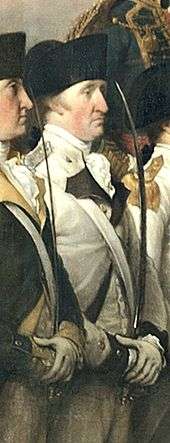Christian of the Palatinate-Zweibrücken (1752–1817)
Christian Graf[1] von Forbach, then Christian Marquis de Deux-Ponts[2] and later Christian Freiherr[3] von Zweibrücken[4] (1752–1817) was an officer of the French army and later a general of the Royal Prussian and then of the Bavarian Army, at last in the rank of General der Infanterie.[5] He may not be confused with his nephew Christian Freiherr von Zweibrücken (aka Christian Graf von Forbach, 1782–1859), who was a Bavarian General of Cavalry (General der Kavallerie).[6]

Biography
Christian von Zweibrücken, was the first of six children of Christian IV Herzog von Pfalz-Zweibrücken and Maria Johanna Camasse Gräfin von Forbach. He was born in Zweibrücken. The children, were unable to succeed to their father's Duchy due to the morganatic nature of their parents' marriage at first, but were allowed to wear the name Freiherr von Zweibrücken in 1792.[5]
Due to a former business agreement of Louis XV of France and his father from March 1751, who promised to the French king to raise a battalion of infantry for France when and if needed,[7] the Infantry Regiment "Royal Deux-Ponts" (raised on 19, 1757) of two battalions to the French crown after the outbreak of the Seven Years' War, when it was at first deployed in the Battle of Rossbach. The commander of the regiment at this time was Christian von Forbach, and his brother Philippe Guillaume (later renamed to Wilhelm) was deputy commander. As part of De Rochambeau's expedition corps he led the "Royal Deux-Ponts" during the American Revolutionary War, where the regiment proved in the Battle of Yorktown, also called the "German Battle", on October 4, 1781.[8] In 1783 he married Adélaïde-Françoise de Béthune-Pologne (1761–1823). The couple had three daughters. The first of them Maria Amalia Charlotte Auguste died in her year of birth 1784. The others were Maria Amalia Charlotte Franziska Auguste Eleonore (1786–1839) and Kasimira Maria Louise Antoinette (1787–1846).[9]
Because of the French Revolution, he left the French forces in the rank of a Colonel, meanwhile titled Freiherr von Zweibrücken, and was taken over by the Prussian Army in the rank of a Major General, where he took part in the campaigns against France during 1794 and 1797.
In the end of the century he was taken over on his request by the Bavarian Army, where he became Lieutenant General and provincial commander of the Palatinate region. In spring of 1800 he became commander of a division, merged from the brigades of Von Deroy and Von Wrede, and fought under the Austrian Feldzeugmeister Kray and under Archduke John of Austria against France for the British crown.
In 1808 he became Geheimer Rat, and in January 1811 he was promoted to the rank of General der Infanterie. Obviously Von Zweibrücken had also plans to replace Von Montgelas by his son-in-law Graf Karl Ernst von Gravenreuth (1771–1826), who was married to his daughter Kasimira.[6] He died in Munich, where he and his brother Wilhelm are buried in the Old Southern Cemetery.[10]
In the European Rosegarden in Zweibrücken a memorial remembers him and his brother.[11]
Awards
- Cincinnati Order
- Order of the Red Eagle (6 June 1796)
- Kurpfalz-Bavarian Military Honour Award ( Militär-Ehrenzeichen) (24 March 1801, predecessor of the Military Order of Max Joseph)
- Grand Cross of the Military Order of Max Joseph (1 March 1806)
References and notes
- Regarding personal names: Until 1919, Graf was a title, translated as Count, not a first or middle name. The female form is Gräfin. In Germany since 1919, it forms part of family names.
- Deux ponts: French for two bridges, means zwei Brücken in German.
- Regarding personal names: Freiherr is a former title (translated as Baron). In Germany since 1919, it forms part of family names. The feminine forms are Freifrau and Freiin.
- also findable under Christian von Zweybrücken
- Zweibrücken (German), Pierer's Universal-Lexikon.
- Eberhard Weis: Montgelas: Der Architekt des modernen Bayerischen Staates 1799- 1838 (German), 2005, pp. 470-473. ISBN 978-3-406-03567-8
- France and Great Britain on the Eve of American Independence - The officer corps Archived 2008-11-21 at the Wayback Machine.
- Royal Deux-Ponts Infanterie durant la Guerre d'Indépendance (French).
- Christian, Graf, Marquis de Deux-Ponts, Geneanet.
- Mößlang: Gedenkplatte bei den Arkaden an der Außenmauer des Alten Südlichen Friedhofs. (German).
- Preliminary Survey of Sites Associated with the Lives and Deeds of Foreign-born Heroes of the American Revolution Archived 2009-01-17 at the Wayback Machine, p. 42.